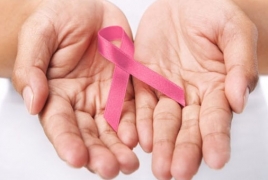
People with advanced HER2-positive breast cancer may soon have some new treatment options after two experimental drugs performed well in clinical trials, Forbes reports.
Around 15-20% of people with breast cancer have cells positive for HER2, meaning that they can be treated with drugs which directly target the HER2 protein, most commonly trastuzumab (also known as Herceptin), often in combination with chemotherapy. Around 80% of HER2-positive patients survive for 10 years or more, with most of these people having no signs of disease after this time. However, many people still experience resistance to treatments and the cancer often spreads, meaning new treatment options are urgently required.
The new research, featuring separate studies of two novel therapies for HER2-positive breast cancer, trastuzumab deruxtecan (T-DXd) and tucatinib, was presented today at the San Antonio Breast Cancer Symposium.
The first new therapy, T-DXd, is an example of a antibody-drug-conjugate treatment, where an antibody (in this case targeted to HER2 called trastuzumab) acts like a grappling hook, attaching to cancer cells and delivering a payload of chemotherapy. The chemotherapy drug in this case stops DNA replication, meaning cancer cells cannot effectively divide. However, it isn’t the first HER2-targeting drug of this type. Another, T-DM1, involves trastuzumab combined with a different type of chemotherapy agent, but patients can develop resistance to these drugs, requiring a change of tactics.
The second project involved a global trial called HER2CLIMB and tested a new drug called tucatinib, which targets HER2-positive cells. The trial enrolled over 600 patients with advanced HER2-positive breast cancer, nearly half of whom had their cancer spread to the brain. Tucatinib was used in combination with trastuzumab and capecitabine for half of the patients, whilst the other half was given a placebo instead of tucatinib. For those given tucatinib, 45% of patients were alive after two years, compared to 27% of patients who did not receive the drug as part of their treatment.

